Key takeaways
- Portland’s writers community emphasizes encouragement and openness, fostering a supportive environment for growth.
- Critique circles serve as safe spaces for honest feedback, helping writers improve while maintaining a sense of collaboration.
- Effective participation involves clear intentions, separating ego from work, and framing critiques as questions to promote constructive dialogue.
- Active engagement in critique circles enhances connections with other writers, boosts self-editing skills, and establishes a consistent creative routine.
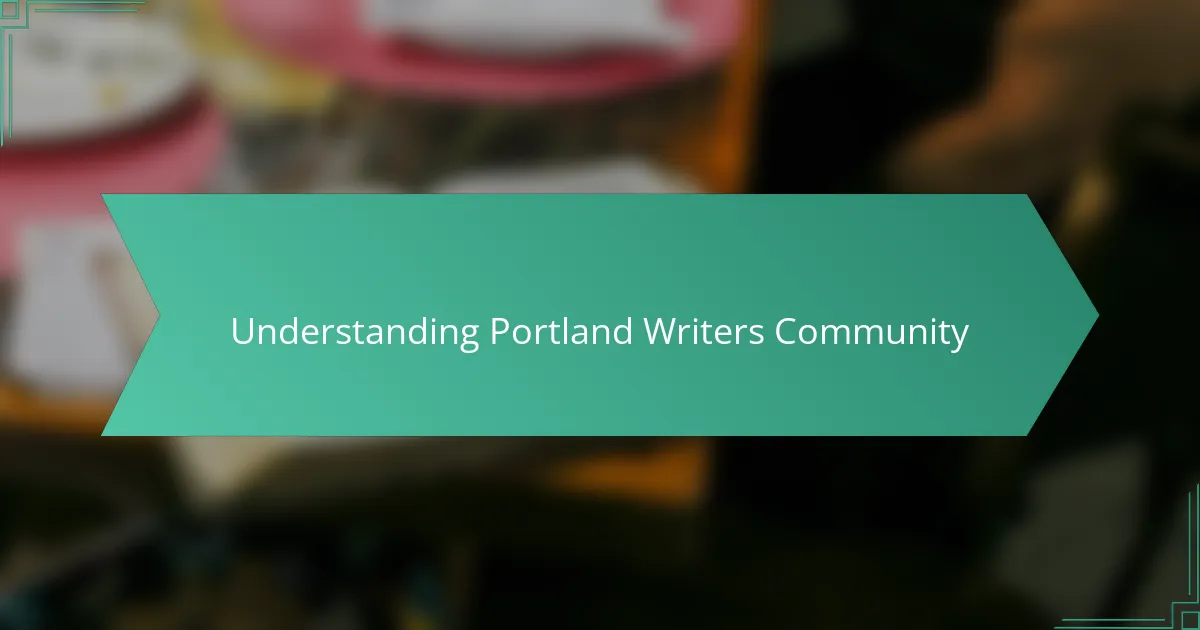
Understanding Portland Writers Community
Portland’s writers community feels like a vibrant mosaic of voices, each bringing their own stories and styles to the table. I remember walking into my first meetup, unsure if I’d fit in, only to find that genuine encouragement is at the heart of this group. Have you ever felt that spark when someone truly hears your words? That’s exactly what Portland writers offer—an open ear and an open heart.
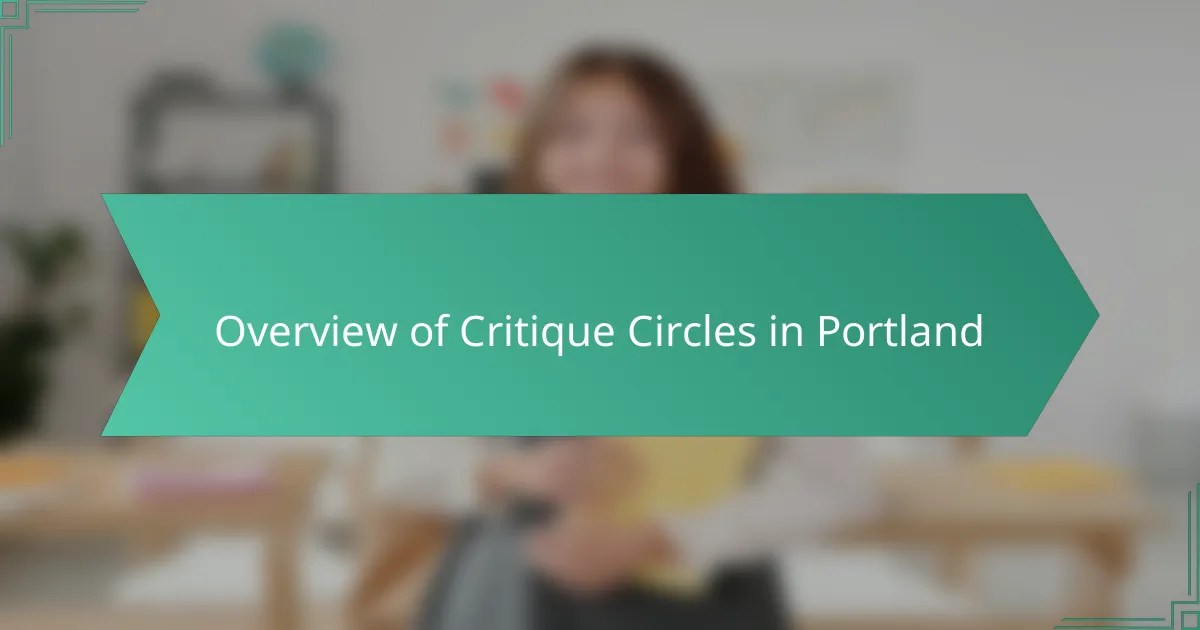
Overview of Critique Circles in Portland
Critique circles in Portland are more than just a gathering of writers—they’re like mini communities where trust and honesty grow side by side. I was surprised by how quickly feedback felt less like judgment and more like a shared mission to help each other shine. Have you ever experienced that moment when someone’s insightful comment unlocks a new layer in your work? That’s the magic these circles hold.
What struck me most is the variety of formats—some groups meet in cozy coffee shops, others in quiet libraries or even lively bookstores. Each circle seems to develop its own rhythm, balancing constructive criticism with encouragement in a way that feels natural. I found myself drawn to the ones where dialogue flows openly, making every meeting feel like a creative jam session.
Navigating these circles took patience, especially in learning to both give and receive feedback gracefully. But that process taught me so much about my writing and myself. If you’re wondering how to dive in, I’d say start by just showing up and listening; the rest often falls into place when you least expect it.
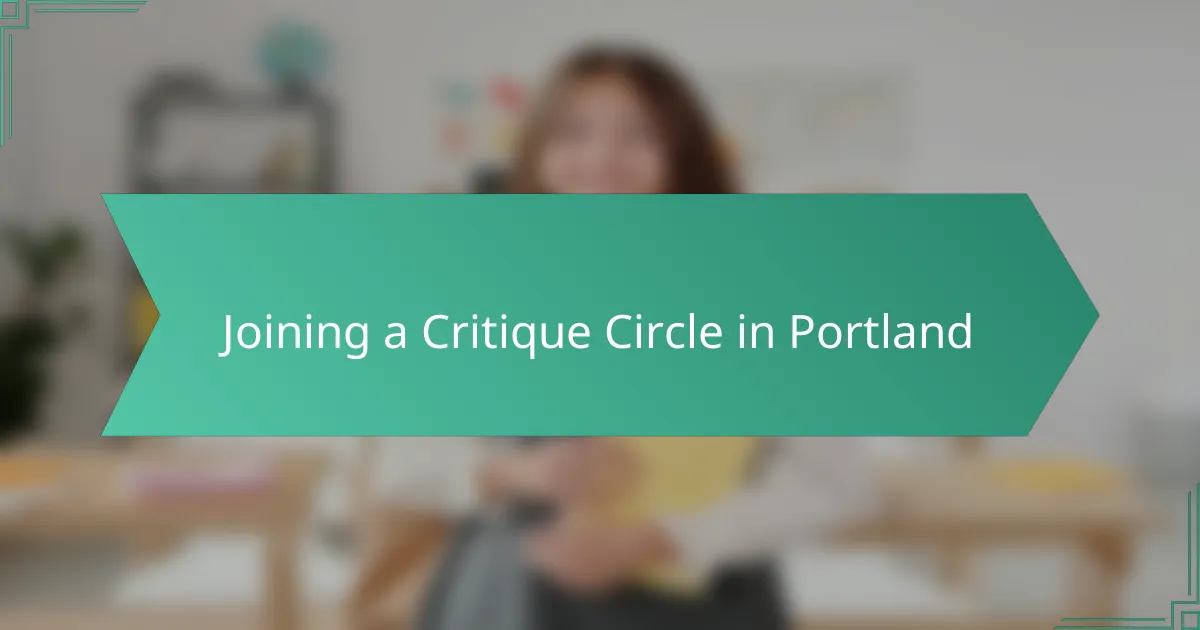
Joining a Critique Circle in Portland
Stepping into my first Portland critique circle felt a bit like entering a new neighborhood—I wasn’t sure where I belonged at first. I asked myself, “Will my writing resonate here?” But the warmth and openness of the group quickly erased that doubt. Have you noticed how just being welcomed can transform your entire creative experience?
Finding the right circle wasn’t immediate. I tried a few different groups, some more formal, others casual, until I found one where the feedback felt both honest and kind. What I loved most was how everyone’s voice mattered equally, and the collective goal was always growth, not competition. It made me realize that joining is as much about community as it is about craft.
If you’re thinking about joining a critique circle in Portland, my best advice is simple: show up with an open mind and a willingness to listen. The first few meetings might feel awkward, but trust me, those moments are the groundwork for deeper connections and breakthroughs in your writing. Have you ever been pleasantly surprised by how quickly a new group can feel like a second home? That’s exactly what happened for me here.
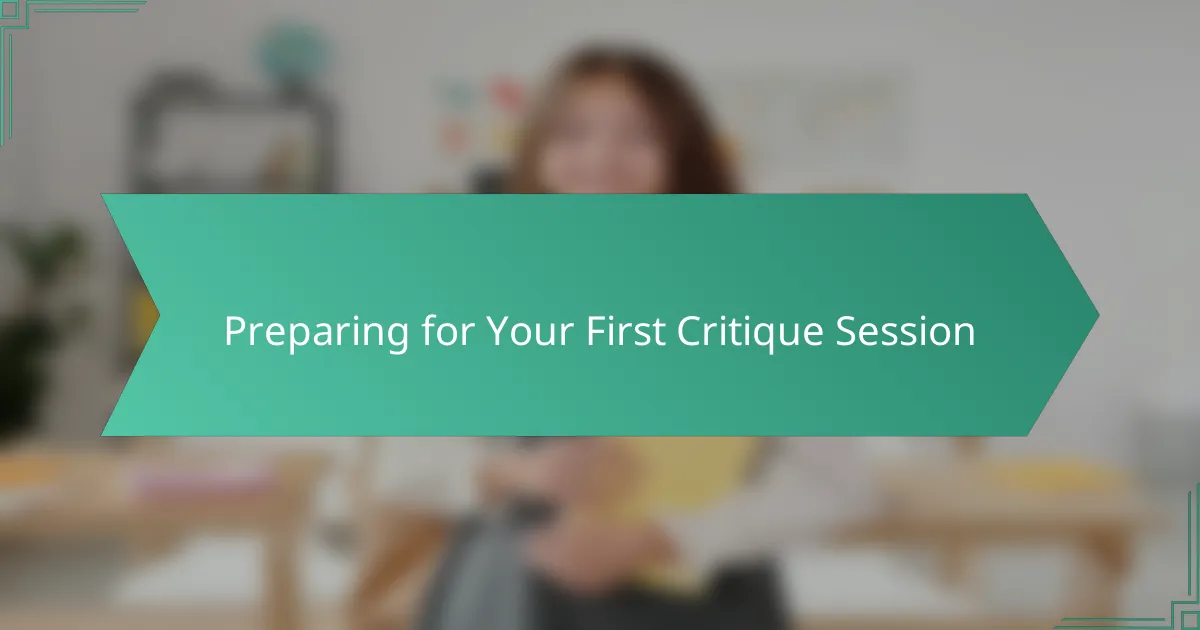
Preparing for Your First Critique Session
I made sure to bring a piece I felt ready to share but wasn’t too attached to—it helped me stay open to feedback without feeling defensive. Have you ever noticed how holding your work too tightly can block your growth? Letting go a little made all the difference.
Before my first session, I spent some quiet time reading over my piece out loud. That simple act revealed awkward phrases and rhythms that I didn’t catch on the page. Do you find reading aloud helps you hear your writing with fresh ears? It definitely prepared me to receive critiques more thoughtfully.
I also jotted down a few questions about my story to guide the conversation—things I genuinely wanted input on. Having a clear focus made the feedback feel less overwhelming and more like a collaboration. Could setting intentions be the secret to making critique sessions feel like a creative partnership rather than a performance? In my experience, it sure was.
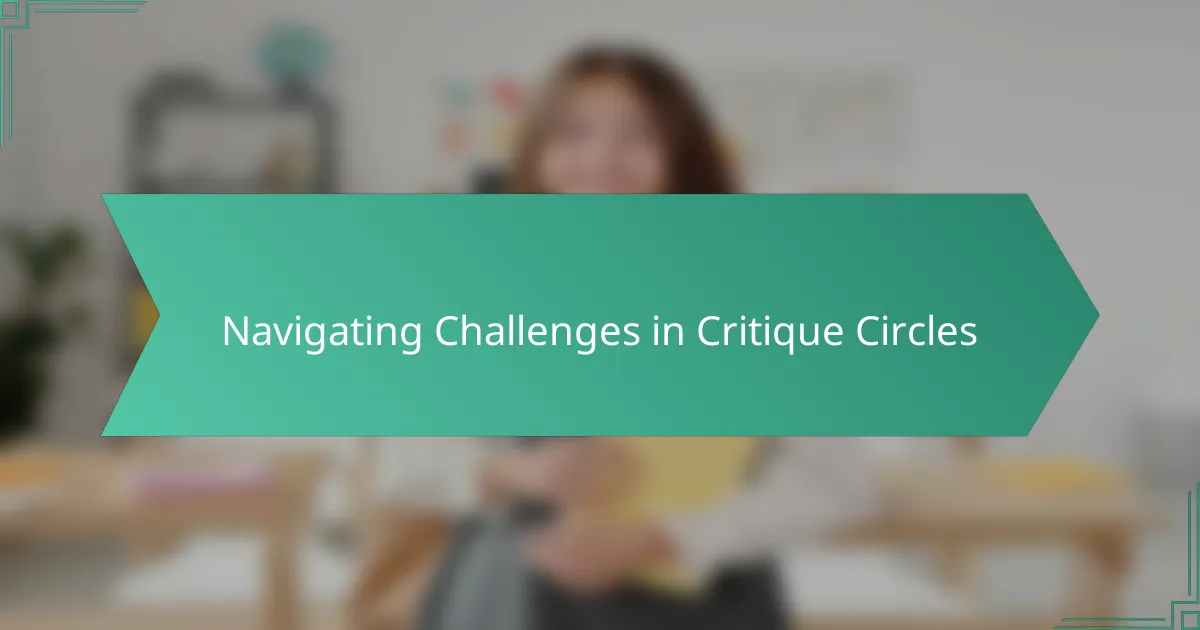
Navigating Challenges in Critique Circles
Navigating challenges in critique circles often felt like walking a tightrope for me—balancing openness with a natural instinct to protect my work. Have you ever felt that sting when feedback hits a sensitive spot? I found that acknowledging my initial defensiveness helped me step back and truly hear what others were offering, turning critiques into stepping stones rather than setbacks.
One challenge I faced was learning to give feedback that was honest but gentle. It’s harder than it sounds! I remember fumbling through my first few comments, worried about hurting feelings, until someone gently reminded me that kindness and candor aren’t mutually exclusive. That insight transformed my approach and made the whole circle feel safer and more productive.
Sometimes, the hardest part was handling conflicting opinions. With so many creative minds in one room, it’s easy to feel overwhelmed or second-guess your choices. I came to see these moments as valuable opportunities to trust my own voice amid the noise. Have you found that wrestling with different perspectives actually sharpens what you want to say? For me, those challenges became some of my best growth experiences.
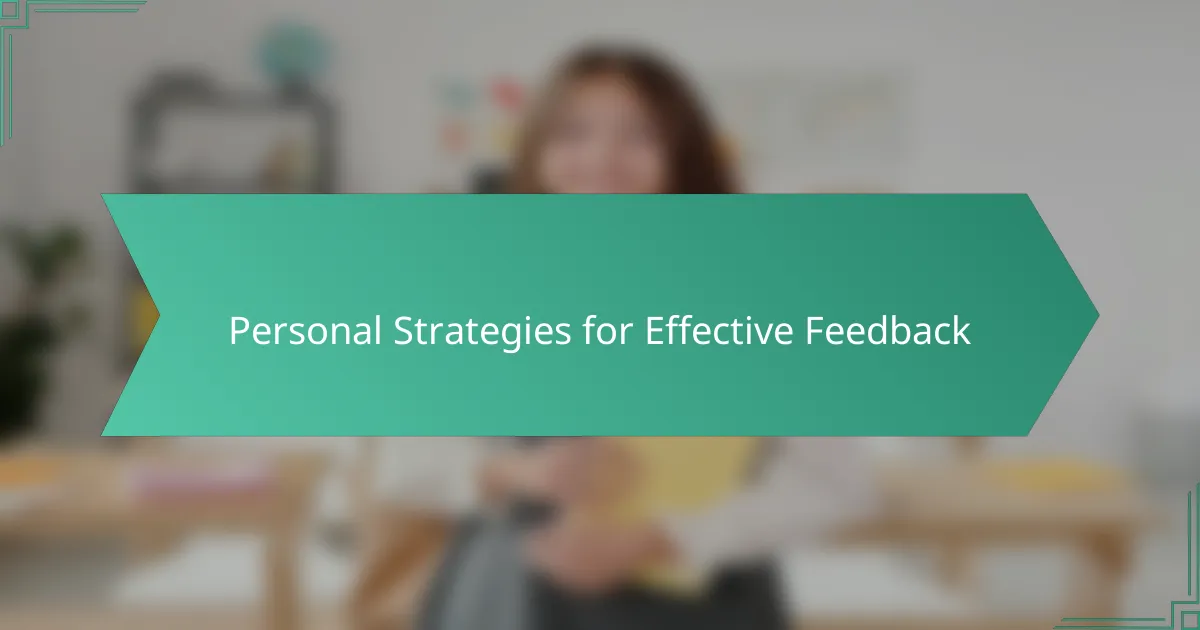
Personal Strategies for Effective Feedback
Learning how to give useful feedback took me some trial and error, but I quickly realized the importance of balancing honesty with empathy. Have you ever hesitated to be truthful because you didn’t want to hurt someone’s feelings? I found that framing critiques as questions or suggestions rather than commands kept the tone constructive and opened up dialogue instead of shutting it down.
On the receiving end, I made it a point to separate my ego from the work. That wasn’t always easy—I mean, how do you not feel a little vulnerable when someone points out your story’s flaws? But with time, I learned to listen for the value behind each comment, even if it stung at first. Asking myself, “What can I learn here?” rather than “Why am I being attacked?” shifted the whole experience.
Aside from attitude, practical strategies helped me stay focused, like taking notes during feedback and clarifying points I didn’t understand right away. Have you tried pausing to paraphrase a critique back to the giver? It not only shows you’re engaged but often uncovers nuances you might have missed. That simple step made my revisions much clearer and less intimidating.
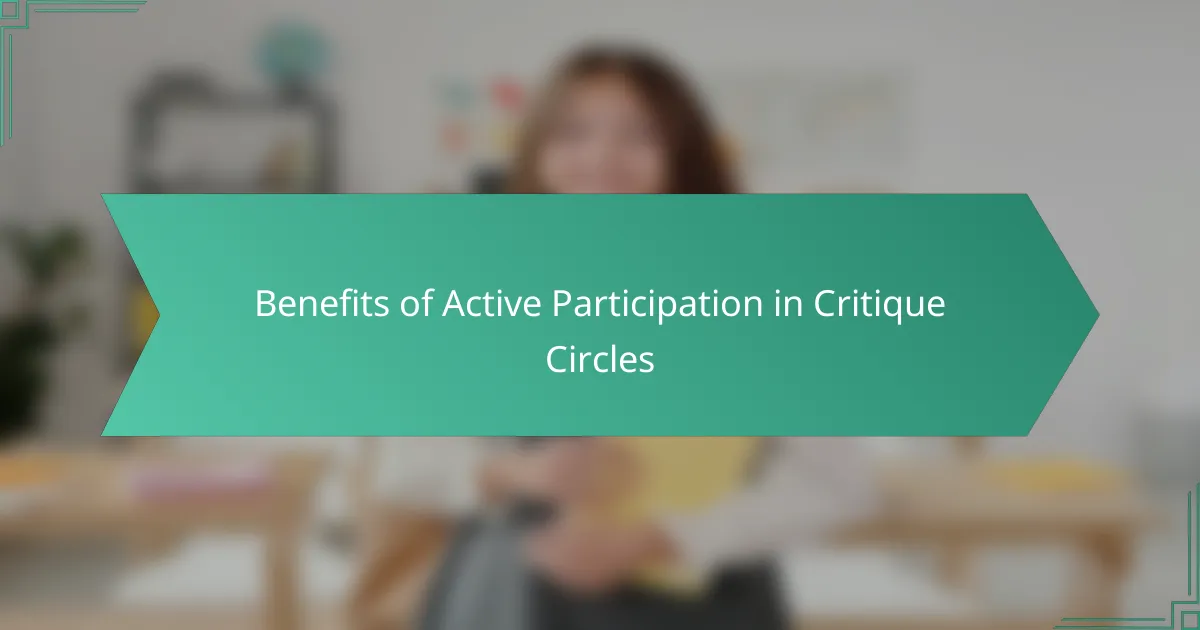
Benefits of Active Participation in Critique Circles
One of the biggest benefits I found in actively participating in critique circles was how it deepened my connection to other writers. It wasn’t just about getting feedback—it was about joining a network where encouragement and honest insight helped me push past my limits. Have you ever noticed how sharing your work regularly builds both confidence and a sense of belonging? That steady rhythm of exchange made me grow not only as a writer but as a member of a creative community.
Another advantage is the way critique circles sharpen your ability to self-edit. Listening carefully to diverse perspectives forced me to step outside my own biases and consider new angles. I recall moments when a single comment revealed blind spots I hadn’t even realized were there. Isn’t it fascinating how seeing your story through someone else’s eyes can transform your approach to revision? For me, this ongoing practice turned my drafts into stronger, more nuanced pieces.
Finally, the discipline of active participation gave me a reliable creative routine. Showing up week after week meant I was continuously producing, reflecting, and improving. I started to see critique circles not just as feedback sessions but as essential checkpoints that kept me motivated. Have you ever felt how a consistent creative commitment can turn writing from a daunting task into an exciting journey? That shift was invaluable for sustaining my momentum and enthusiasm over time.